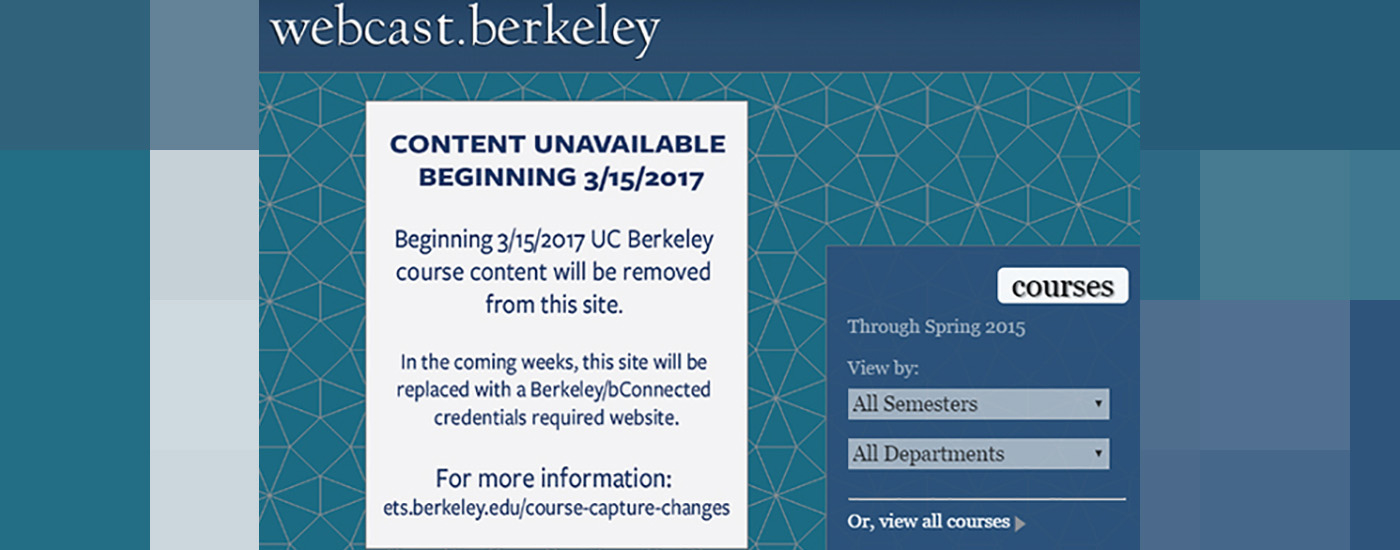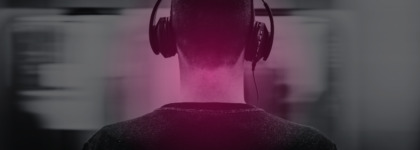UC Berkeley Revoking Public Access to Educational Media, Cites Captioning Expenses
Updated: August 7, 2024
In a recent letter to their campus community, the University of California, Berkeley (UC Berkeley) announced that they are revoking public access to their free, legacy Course Capture (classroom lecture) videos and podcasts.
Beginning on March 15, 2017, all 20,000+ online educational audio and video publications on UC Berkeley’s massive online open courseware (MOOC) website, including mirrored content hosted on their YouTube and iTunesU channels, will only be availa
ble to campus community members with login credentials supplied by the University of California’s state college system.
In other words, video and audio recordings of entire courses that used to be open to global, public consumption for free are now gated by login info only supplied to the official students, faculty, and staff of UC Berkeley.
No changes were announced, however, to the availability of the free, public-facing courses on UC BerkeleyX, hosted by Harvard and MIT’s multi-institutional MOOC system, EdX.org.
The Reasoning Behind a Difficult Decision
In September of 2016, the administration hinted that they were planning on removing the inaccessible, public-facing content from their website instead of fixing any accessibility issues.
At the time, UC Berkeley cited “financial constraints,” like captioning costs, as the main barrier to keeping the audio and video recordings publicly available.
According to Roqua Montez, a spokesman from the university who was quoted in an East Bay Times article, “Remediation for accessibility issues would need to be determined for each video, but captioning alone would exceed a million dollars…”
In their letter to the campus community, the university also expressed concern that having legacy course content publicly available on their MOOC site would allow them to “to better protect instructor intellectual property from ‘pirates’ who have reused content for personal profit without consent.” Up until now, UC Berkeley has not cited copyright issues as a challenge to keeping their online course content publicly available.
UC Berkeley’s History with the DOJ
In 2016, the US Department of Justice (DOJ) received letters of complaint stating that UC Berkeley’s MOOC media content was riddled with accessibility issues including low-color contrast, missing and inaccurate (automatically generated) audio and video captions, and screen-reader accessibility issues — all violations of Title II of the Americans with Disabilities Act (ADA).
UC Berkeley subsequently received a letter from the DOJ urging the school to improve accessibility features of their public MOOC media content or else face litigation and potential compensatory damages to any aggrieved individuals.
In response to this letter, the university has chosen to remove public access to these audio and video files altogether, essentially narrowing the scope of their legal obligations to on-campus accommodations. In their letter to the campus community, the administration has stated they will address any accessibility issues associated with their legacy course media on a case-by-case basis with “students and UC Berkeley community members who have demonstrated an accessibility need.”
What This Means for MOOCs & Web Accessibility
Nobody appears to be happy about the UC Berkeley decision, including the school itself. In their initial response to the DOJ, the university described the prospect of removing their public-facing educational content as “unenviable.”
Nonetheless, UC Berkeley’s decision will have an effect on both the free, online public education movement and those pushing for a more accessible web.
Luckily for disability rights advocates, the lawsuit against Harvard/MIT over a lack of video captioning for their MOOC system is getting a lot of support from judicial bodies. However, the advent of UC Berkeley’s decision to restrict the public’s access to free, high-quality course content, though it may have been carefully considered, tells us that the road to web accessibility may take a bit more effort to traverse than previously expected.
—
Read UC Berkeley’s full letter to their campus community.






